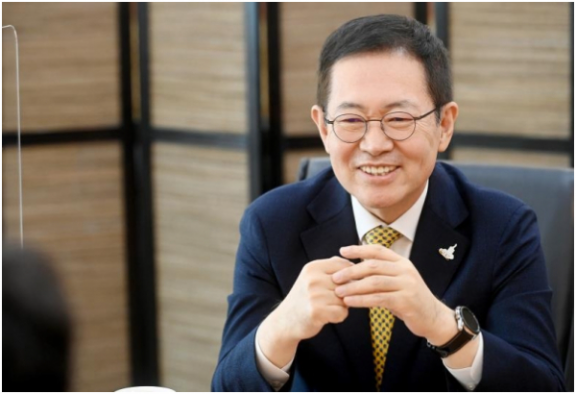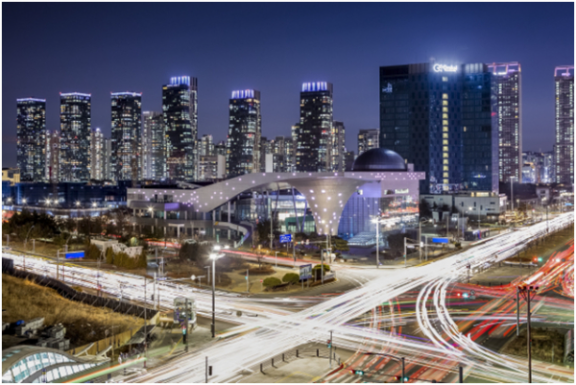Incheon’s Manufacturing Sector Refining Itself as National Economic Growth Driver

Incheon Mayor Park Nam-chun
Incheon is becoming a global city that drives the growth of South Korea. The following is an interview with Park Nam-chun, the city’s seventh popularly elected mayor who took office in July 2018. — Ed.
The Ministry of SMEs and Startups picked Songdo, Incheon as the sole final candidate for the K-Bio Lab Hub in July this year. What is the meaning of it?
The biotech cluster in Songdo is already developing itself as a leading one in the global biotech sector. It is home to more than 30 leading biotech companies, including Celltrion and Samsung Biologics, and they are aggressively increasing investment there. As a result, Incheon has been the city with the largest biopharmaceutical production volume in the world since 2018.
A large number of companies doing business with them are also found in Songdo along with biotech startups with innovative ideas. The K-Bio Lab Hub is to help such companies expand their activities successfully.
In October last year, Incheon attracted a national training center for those working in the biotech industry. There, the city is working with more than 10 colleges and 11 research institutes so that they can enhance their abilities.
We hear that many domestic and global biotech companies are coming to Songdo. Would you introduce some of them?
At present, SL POGEN, a South Korean DNA vaccine developer and producer, is planning to enter Songdo and many global companies, including Sartorius of Germany, are considering building facilities in Songdo.
In addition, 12 public and 11 private biotech startups are currently in the region, ranging from healthcare service providers to bio-reagent and nanomaterial developers. The K-Bio Lab Hub is expected to provide extensive support for them and those to enter Songdo later.
How is Incheon preparing for Industry 4.0?
Industrial complexes in Incheon and the manufacturing sector of the city led the industrialization of South Korea in the past. Now, those are creating added values and jobs by technological upgrading and business diversification.
The South Korean government decided in 2019 to build a smart and green industrial complex in Incheon. The next year, it decided to launch a large-scale renovation project for industrial complexes in the city. This means the city’s existing manufacturing infrastructure will serve as a foundation of future industries.
Incheon’s automotive industry, which has led the city’s manufacturing sector for long, will be combined with urban air mobility (UAM) technologies. At the same time, a biotech and healthcare cluster will be set up so that more related products can be manufactured at the existing facilities.
In Incheon, the gap between new and old downtown areas is still very wide in terms of education, traffic, culture, etc. What is your plan for a more balanced growth?
At present, the city is implementing five strategies to that end. Those are to better utilize historical and cultural resources, form an economic foundation to attract more young people, renovate old empty houses, form spaces where people can gather, and expand basic living infrastructure.
The gap is a problem common to many South Korean cities and cannot be fixed right away. However, the gap in Incheon is indeed decreasing with time.

Incheon Startup Park
Incheon declared that it would stop serving as a metropolitan landfill in 2025. Is the stance as it is?
It makes no sense at all that one city is in charge of waste disposal for another city. Our declaration has nothing to do with not in my backyard. It is to guarantee a better environment for those who will live in Incheon in the future.
Both Seoul and Gyeonggi Province are capable of handling their wastes on their own. In Seoul, Gyeonggi and Incheon, direct burial of household waste is scheduled to become illegal in 2026. Waste incineration and incineration ash recycling will lead to a significant decrease in the amount of buried ash and incombustible waste.
Every city needs to handle its waste on its own, and I don’t think that there is no land for a landfill in Seoul. Every local government can develop advanced waste disposal technologies and formulate effective policies like we have done.
What is the current progress of the green landfill and incineration facilities in Incheon?
The sites of the resource recycling centers will be found based on extensive research and talks with districts. The city already reached a tentative agreement with Seo-gu in February this year, and with five other districts in July.
We are currently discussing amenity construction and financial incentives for the districts where the centers will be located. Every decision will be made based on the principle of fairness, and various projects will be planned so that everyone can benefit.
What is your job creation plan for the young generation in Incheon?
We are seeking various ways for those wishing to get a job in the city and those wishing to start their own business in the city. Our current plans include the training center mentioned above, startup parks, the UU Base, and many more. We are also working on policies for the generation’s residence, leisure, cultural participation, etc.